
Domingo Faustino Sarmiento was an Argentine activist, intellectual, writer, statesman and President of Argentina. His writing spanned a wide range of genres and topics, from journalism to autobiography, to political philosophy and history. He was a member of a group of intellectuals, known as the Generation of 1837, who had a great influence on 19th-century Argentina. He was particularly concerned with educational issues and was also an important influence on the region's literature.
Education in state institutions is at the initial, primary, secondary and tertiary levels and in the undergraduate university level. Private education is paid, although in some cases state subsidies support its costs. According to studies by UNESCO, education in Argentina and Uruguay guarantee equality to have institutional features that hinder the commercialization of education, as well as Finland has characteristics that favor multiethnic population education and special education, education favors Argentina equality. According to the last census, the illiteracy rate is 1.9%, the second lowest in Latin America. In the last decade, Argentina has created nine new universities, while the outflow of university students increased by 68%.
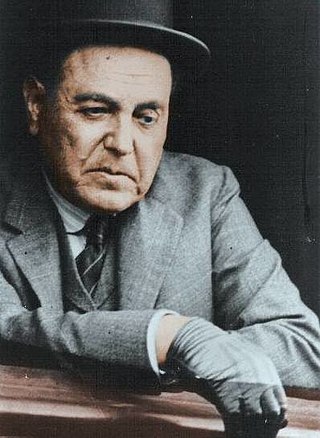
Juan Hipólito del Sagrado Corazón de Jesús Yrigoyen was an Argentine politician of the Radical Civic Union and two-time President of Argentina, who served his first term from 1916 to 1922 and his second term from 1928 to 1930. He was the first president elected democratically by means of the secret and mandatory male suffrage established by the Sáenz Peña Law of 1912. His activism was the prime impetus behind the passage of that law in Argentina.

Recoleta is a barrio or neighborhood of Buenos Aires, Argentina, located in the northern part of the city, by the Río de la Plata. The area is perhaps best known to be the home of the distinguished Recoleta Cemetery. It is a traditional upper-class and conservative neighborhood with some of the priciest real estate in the city, known for Paris-style townhouses, lavish former palaces and posh boutiques.

José Pedro Montero was President of Paraguay from 1919 to 1920.

The La Plata National University is a national public research university located in the city of La Plata, capital of Buenos Aires Province, Argentina. It has over 90,000 regular students, 10,000 teaching staff, 17 departments and 106 available degrees.

The Mariano Moreno National Library is the largest library in Argentina. It is located in the barrio of Recoleta in Buenos Aires. The library is named after Mariano Moreno, one of the ideologists of the May Revolution and its first director.
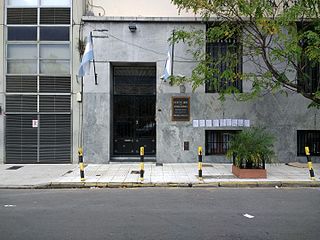
The Instituto Libre de Segunda Enseñanza is a high school that depends on the Universidad de Buenos Aires (UBA). It has approximately 1000 students, and it is located in Libertad 555 street, Capital Federal, Buenos Aires, Argentina. As it is affiliated with the University, it has an admission process that lasts one year and consists of an admission course, which involves multiple exams in Mathematics, History, Language and Geography. Almost all of its faculty teaches in the UBA, and physical education used to be performed at the Universidad de Buenos Aires campus, in Ciudad Universitaria, until 2016. One of its characteristics is that there is no need to do the CBC, because it offers its students the possibility of attending an extra 6th year in the career they have chosen.

Daniel Fernando Filmus is an Argentine politician and academic, who served as the country's Minister of Science, Technology and Innovation, from 2021 to 2023.

Aníbal Domingo Fernández is an Argentine Justicialist Party politician, lawyer, and certified public accountant. Throughout his career, he has remained a close ally to the former Presidents Néstor Kirchner and Cristina Fernández de Kirchner. Between 2021 and 2023, he served as Argentina's Minister of Security in the cabinet of President Alberto Fernández.

Callao Avenue is one of the principal thoroughfares in Buenos Aires, Argentina.
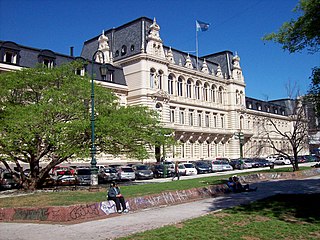
The Sarmiento Palace, commonly known as the Pizzurno Palace, is an architectural landmark in the Recoleta section of Buenos Aires and the location of the Argentine Ministry of Education.
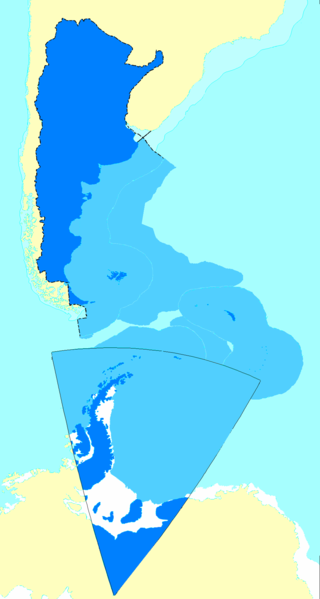
Argentine irredentism refers to the idea that Argentina has suffered large territorial losses early in the 19th century to neighboring countries, and that it must strive to regain control of them, forming "Great Argentina", envisioned with the same borders as the Viceroyalty of the Río de la Plata. This idea surged in popularity in the late 19th century, and peaked in influence in the late 1940s and early 1950s. All of these claims have been abandoned by Argentina, save for the Falkland Islands sovereignty dispute.

José Domingo Arias Villalaz is a Panamanian economist and politician, and was an unsuccessful candidate in the 2014 presidential elections.
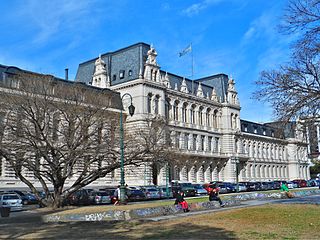
The Ministry of Education of Argentina was a ministry of the national executive power that oversaw education policies on all educational levels, alongside the governments of the twenty-three provinces of Argentina and the City of Buenos Aires.

The Goethe-Schule Buenos Aires belongs to the Goethe School Association, a nonprofit Civil Association that brings together the parents of students. Since it is a German School Abroad (DAS), it is sponsored by the Federal Republic of Germany. It is a recognized cultural exchange school that teaches and promotes the German language. It is located in the town of Boulogne, in the province of Buenos Aires, 20 km north of the center of the City of Buenos Aires and includes three levels: kindergarten, primary school and secondary school. The school has more than 1500 students in the three levels. A fourth section of the school is the Humboldt Academy, an educational institution dedicated to teaching foreign languages, mainly German, where courses for adults and children are taught outside of the school’s regular classes.

Elina González Acha de Correa Morales was an Argentine educator, scientist and women's rights activist. In her early days, she was among the first graduates of the Argentine Normal School and was a painter, winning international recognition for both her textbooks and paintings. She was the driving force behind the founding of the Geographical Society of Argentina and served as its president from its establishment until her death. She and her husband, Argentina's first renowned sculptor, Lucio Correa Morales were defenders of the land claims of the Ona indigenous people.

Nicolás Barrios-Lynch (1910–1986) was an Argentine educator and pioneer of the rural libraries movement across South America. After his teaching career, he became a dedicated promoter of public and rural libraries, and the inclusion of foreign books and texts of Argentine original peoples literature in public education, spreading commercial education for entrepreneurship of educational tourism, became Director of Rural Education programs at the Ministry of Public Transportation, and at Argentina's Ministry of Education contributing in philanthropic initiatives for the sustainability of the National Library of Teachers located at the Sarmiento Palace.

Alejandro Oscar Finocchiaro is an Argentine lawyer and politician who served as Minister of Education, Culture, Science and Technology of Argentina. Previously he was general director of Culture and Education of the province of Buenos Aires and Secretary of Educational Policies and Teaching Career in the Autonomous City of Buenos Aires. Since 2021, he has been a National Deputy elected in Buenos Aires Province.
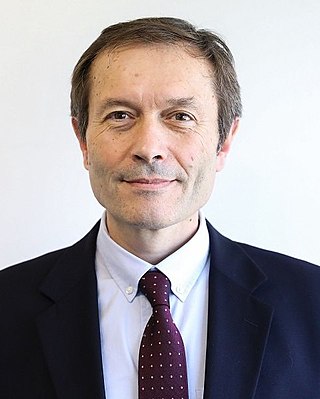
Gustavo Beliz is an Argentine politician and expert in global governance.



















